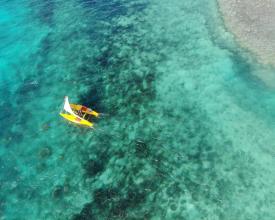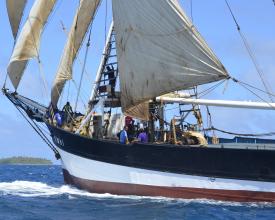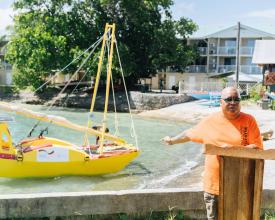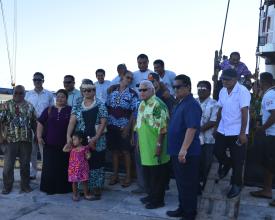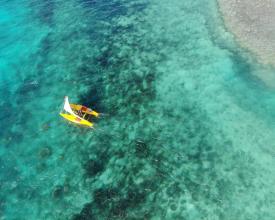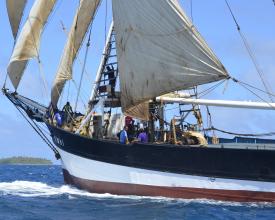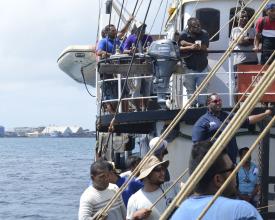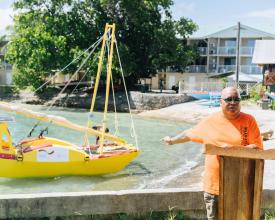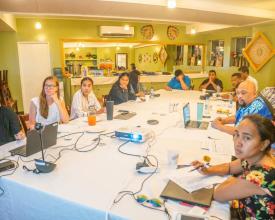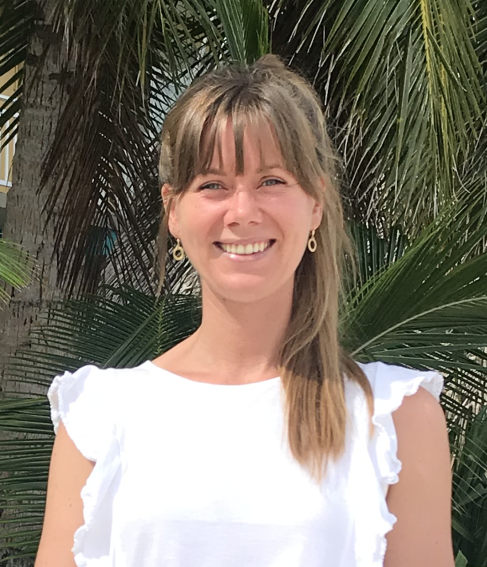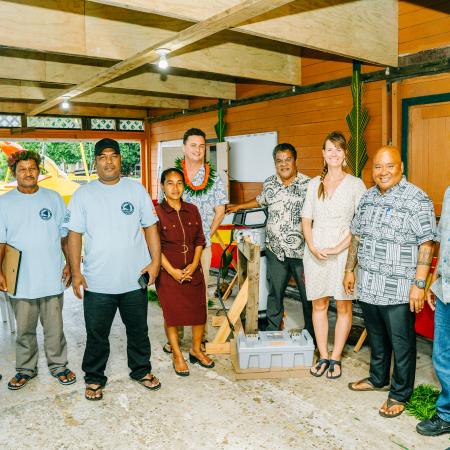
Transitioning to Low Carbon Sea Transport in the Marshall Islands
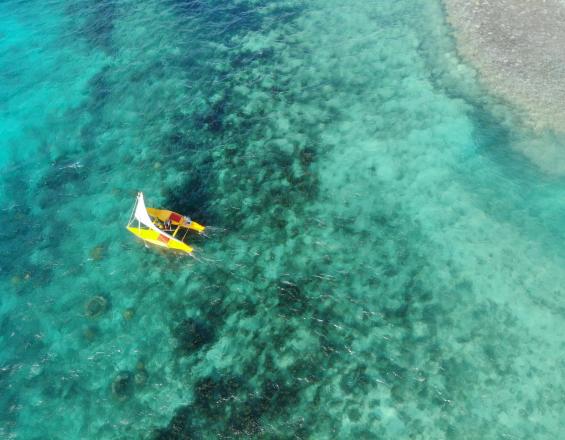
The Republic of the Marshall Islands (RMI) relies on maritime transport for economic activity, connectivity and resilience. Connectivity, especially for the remote islands and atolls, is vital for access to services and socioeconomic opportunities for citizens. Sea transport ensures the delivery of education, health care and economic development, and plays a role in responding to climate change impacts.
RMI is almost entirely dependent on imported fossil fuels, the costs are high and a heavy burden on national and household budgets. Shifting to renewable energy sources helps reducing this burden and supports inclusive and sustainable economic growth.
RMI is a world leader in advocating for action on climate change and the only country to explicitly include domestic sea transport in its Nationally Determined Contributions (NDCs). The country set the goal to reduce GHG emissions from domestic shipping by 40 per cent by 2030. Full decarbonisation is to be achieved by 2050.
Context
Challenges addressed
Goal 7 of the Sustainable Development Goals is Affordable and Clean Energy. In the Republic of the Marshall Islands (RMI) in the Pacific island region -- a country that is 99.99% ocean and is therefore highly dependent on sea transport -- domestic ships run mainly on costly imported fuels that also emit a significant volume of greenhouse gases (GHGs).
RMI faces an existential risk from climate change-induced sea level rise. The project supports RMI in delivering its Nationally Determined Contributions under the United Nations Framework Convention on Climate Change (UNFCCC). Central to the achievement of the goals is the reduction of the country’s GHG emissions from sea transportation.
Shifting from the use of fossil fuel propulsion to renewable energy sources is a challenge in the Marshall Islands mainly due to access to funding and the remoteness of outer islands.
Location
Process
Summary of the process
The project coveres all aspects of sustainable sea transport and therefore the knowledge is shared between the building blocks
Building Blocks
Sustainable Sea Transport inside the lagoon and between atolls of the Marshall Islands
Ri Majol, the people of the Marshall Islands were known for their superior boat building and sailing skills for centuries. They traveled frequently between their atolls (for trade and war) on big offshore canoes called Walap (some of them 100ft long). The lagoons of their low-lying coral atolls where crested by sails of smaller outrigger canoe designs for rapid inside lagoon transportation, food gathering and fishing. Together with Waan Aelõñ in Majel, we are reviving the traditional knowlege combined with modern technology. The ambitious goals of the Marshall Islands in the sea transport sector have become the main driver and motivation for us to pursue and to transition towards a low carbon fleet for the Marshall Islands for transport inside the lagoons and between atolls. Currently, a 150 ft. Training Vessel is about to be constructed and delivered to RMI by the 2nd half of 2022. After the agreement of the design, the market survey process started with the objection to identify shipyards that are interested and capable of building the new built as drafted in the tender design. The Maritime Training Approach in the Marshall Islands sets a clear focus on Low Emission Sea Transport Education and will train future sailors as part of the national fleet operators.
Enabling factors
Today, the traditional outrigger canoe designs are not in use for inter-atoll voyages in RMI anymore. The traditional inter atoll voyages stopped and none of the traditional inter-atoll canoes (Walap) survived till today. Nowadays, offshore transport tasks are mainly carried out by the government owned Marshall Island Shipping Corporation (MISC) and private contractors with conventional monohull freighters with motorized engines causing emissions and impact on climate change.
Lesson learned
The charter of SV Kwai - a sailing cargo vessel - in the time period from September to end of December 2020 showed how essential training is in the revitalization of sailing rigged ships that make the way open for a low emission transportation set up in RMI in the future. Sailing trainings took place on SV Kwai for the first time with participants already enlisted by MISC. The training was held with the intention of sailing within the lagoon of Majuro. The aim was to educate on Kwai operations under sail and to train the MISC crew hands on alongside the SV Kwai crew from Kiribati, USA and Australia. An assessment meeting took place after the training to capture the positive outcomes and summarize improvements for upcoming trainings in the future. The trainings already provided a first indication of training needs for the maritime sector in RMI.
Policy Frameworks in the Scope of Transitioning to Low Carbon Sea Transport in the Marshall Islands
The national fleet of the Republic of the Marshall Islands (RMI) highly depends on imported fuels and is therefore a significant source of GHG-emissions. The bilateral program “Transitioning to Low Carbon Sea Transport (LCST)” implemented by RMI and the Gesellschaft für internationale Zusammenarbeit (GIZ) aims at supporting the RMI Government´s planning and decision-making processes with respect to its low carbon future and the reduction of GHG-emissions from domestic sea transport, through consultancy, research, training, coordination of policy support to RMI and supporting in delivering RMI’s commitments under UNFCCC to achieve reduced GHG emissions from domestic shipping 40% below 2010 levels by 2030 and full decarbonization by 2050.
The Marshallese Government founded and is an active member of the High Ambition Coaltion for Shipping (SHAC) at IMO and UNFCCC and due to their ambition, the group of supporters of an ambitious contribution of sea transport to the climate goals is growing. Due to the COVID-19 pandemic, international meetings and high-level conferences are taking place remotely to a high extend.
Enabling factors
The development and facilitation of capacity development under the LCST project has the aim to enhance knowledge of IMO structures and ways to contribute to high-level forums and negotiations such as UNFCCC for different ministries in RMI. RMI plays a key role in securing ambitious goals and climate leadership continously develops with the support of partners to RMI. Through workshops, support on negotiation techniques and media outreach, visibility and recognition is increased and RMI's voice heard on the international stage.
Lesson learned
Together with Independent Diplomat, the project supports the RMI Government in actively participating at high-level policy negotiations and conferences such as the High Ambition Coalition and the IMO.
Developing distance learning resources, presentations and briefs on climate mitigation in shipping to provide an overview of air emissions and climate change issues in maritime transport are highly important
Developing international responses and frameworks to climate change by the shipping sector and delivering web-based information sessions on climate mitigation in shipping and maritime transport help to facilitate workshops in the region and other SIDS.
Highlighting past and on-going IMO activities and the wider industry equip partners with knowledge of relevant debates leading to the adoption and implementation of positions, strategies and declarations in international high-level forums.
Impacts
By making RMI’s sea transport greener and raising energy efficiency, the project is helping the country achieve its Nationally Determined Contribution. Ultimately, this will reduce transport costs and benefit public agencies, private companies and the people of RMI.
The project introduces a wide range of climate-friendly solutions. One of these is developing and pilot-testing low-carbon propulsion technologies in cooperation with partners. Other steps are educating and training ship crews and researchers, as well as using modern energy-efficient sailing technologies and renewable energy. The project takes a two-phase approach. Firstly, it works with partners to assess the fleet’s economic efficiency and emissions. The baseline data from this is to be used to develop and analyse various low-carbon propulsion technologies for all shipping needs.
Secondly, it is designing and building a ship with the selected propulsion technologies and having it tested by the Marshall Islands Shipping Corporation (MISC). In parallel to these activities, the project also provides policy support to the RMI Government throughout the project term. This comes to bear in climate negotiations at the International Maritime Organization (IMO), the United Nations Framework Convention on Climate Change (UNFCCC), and others.
Beneficiaries
Young people as the future of the islands and country, the Marshallese society and the wider Pacific region
Sustainable Development Goals
Story

During the implementation of the project, it became clear that traditional boatbuilding skills are disappearing in the Marshall Islands and that the essential skills are much needed to create a shift to sustainable sea transport in RMI. At WAM, we organised two boatbuilding workshop with 13 Marshallese trained in traditional canoe building skills and energy efficient technology was introduced. Cost efficient and sustainable boatbuilding methods were learned.
Waan Aelon in Majol (WAM) started their 3rd Boatbuilding Workshop on the 18th of October 2021 and was able to bring in 4 professional boatbuilder in carving Marshallese canoes (in their own trade) from four outer islands to learn the modern techniques WAM had acquired through close collaboration with the project. We have trainees from Kwajelein Atoll, Ujae Atoll, Lae Atoll, and Aur Atoll. In just 2 weeks the trainees along with the boatbuilders from WAM, completed the hulls for a new (third) WAM Catamaran and the Proa. The duration of this workshop is 3 months. The foreseen time span for the courses consists of the trainees to build 1 WAM Catamaran, 1 Harry Proa and 4 Marshallese Traditional Canoes, Korkor.
For the 4 Korkor’s, every participant will build his own and take it back to their respective home atoll. In the last month the Korkor’s will be tested at sea along with the Proa and WAM Catamaran.
Tony Alik, the Associate Director for WAM, stated that Aur Atoll does not have any functioning canoes now. The Korkor that will be built by the trainee, will be the only canoe sailing in Aur.
As part of a trail and testing phase, an electrical engine was installed on a WAM Catamaran to have an alternative propulsion on board the boat.

